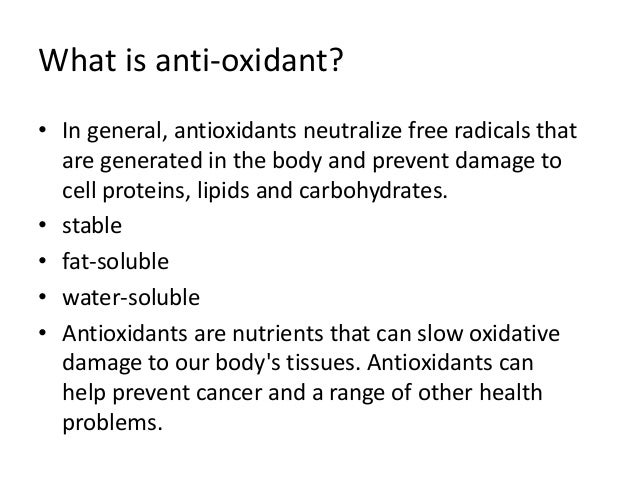
Image source: https://image.slidesharecdn.com/antioxidantnutrients-141228034015-conversion-gate01/95/antioxidant-nutrients-3-638.jpg?cb=1419738055
A widely publicized report has claimed that antioxidants are harmful and fail to provide health benefits. Unfortunately the report only focused on a few antioxidant vitamin supplements such as Vitamin A,C,E and beta-carotene. This skewed report has ignored the fact that countless studies have shown that many other non-vitamin food based antioxidants are healthy and provide protection against cancer, heart disease, Alzheimer's disease, diabetes and other degenerative diseases.
The review appears in a report of The Cochrane Library, a publication of The Cochrane Collaboration, an international organization that evaluates medical research.
Their meta-analysis of 67 randomized studies found that supplemental antioxidant vitamins do not reduce mortality. The review combined evidence from more than 200,000 people and found that, on average, those individuals who took supplements such as vitamin A, beta-carotene and vitamin E actually died younger than those who did not take these supplements.
"The harmful effects of antioxidant supplements are not confined to vitamin A," said review co-author Christian Gluud, M.D. "Our analyses also demonstrate rather convincingly that beta-carotene and vitamin E lead to increased mortality compared to placebo."
Are the conclusions reached by this report true and accurate? In terms of the specific vitamins studied in the survey, the review is essentially correct. In respect of antioxidants in general it is totally incorrect. The reason is that hundreds of dietary antioxidants other than vitamin A, E and beta-carotene are to be found in our diets.
As it only focuses on a few antioxidant supplements this report further increases common misconceptions regarding antioxidants and their effect on our health. Most of the clinical trials that the review covered involved only the antioxidant vitamins, A,C and E and beta-carotene. The review should have stated that it was these specific supplements that they were evaluating and not antioxidants in general. As important as these vitamins are to our health they are not the only antioxidants that our bodies require to sustain optimum health. And taking large doses of any of them could quite feasibly lead to health problems.
However countless scientific studies have shown that polyphenol flavonoids and other plant based antioxidant compounds definitely protect us against cancer, heart disease, Alzheimer's disease, diabetes and other degenerative diseases. These non-vitamin antioxidant compounds are found primarily in fruit, vegetables and spices and are not harmful to our health.
To appreciate fully why the report is irrelevant in respect of antioxidants in general we need to understand the role antioxidants play.
An antioxidant is a substance which, through being oxidized itself, protects other chemicals and substances from oxidation. As a result of this property, antioxidants provide protection against the often highly damaging oxidative processes in our bodies that are caused and perpetuated by free radicals.
Because of their destructive properties, free radicals can cause havoc in our bodies and they have been implicated in a wide range of diseases such as cancer, diabetes, Alzheimer's disease, inflammatory disorders and a number of other pathological processes.
Like most substances found naturally in the body, free radicals are toxic only when they exceed a certain threshold. In certain circumstances, the body actually needs free radicals to fight infection, and there is evidence that too much of one type of antioxidant can be harmful if it eliminates all of a useful free-radical species. Typically, however, an excess - rather than a shortage - of free radicals is by far the greater problem facing our bodies.
An incorrect and potentially damaging perception is that taking one or two "strong" antioxidants will provide protection against free radical damage. Measured against laboratory standards, one antioxidant may indeed prove more effective - or powerful - than another, but this is only true under certain conditions. No one antioxidant neutralizes all free-radical species no matter how potent that compound is. That is the most important reason why we should not rely on high doses of a few antioxidants like vitamin A, C, E and beta-carotene to deal with the multitude of free radicals that we are exposed to. We need an array of antioxidants to neutralize them all.
Beyond a certain threshold, any beneficial substance can become harmful. Antioxidants are no exception, and yet they are often consumed in dangerously high quantities. Vitamin C, for example, is an essential vitamin and a valuable antioxidant. Taken in large does, however, it has been found to damage DNA, increasing susceptibility to cancer. Some antioxidants need the protection and synergistic relationships that can only be provided by other antioxidants. Rather than taking an isolated extract of any one antioxidant, however "powerful", we should be ingesting a wide range of these vital compounds. The best way to ensure we do this is by eating a variety of antioxidant-rich foods such as spices, fruits and vegetables.
As a rule of thumb we should not be taking individual vitamin antioxidants in quantities much above the standard recommended daily allowances. Instead we should be taking foods or other supplements rich in a wide variety of antioxidants. By doing this we will avoid damaging our bodies with high doses of a few antioxidant vitamins and instead provide them with effective protection against diseases associated with free radical damage and aging.